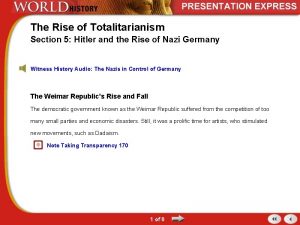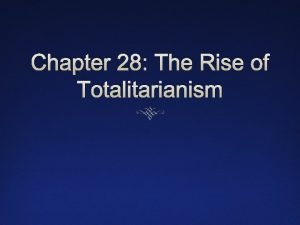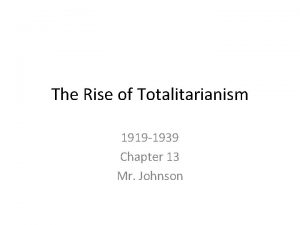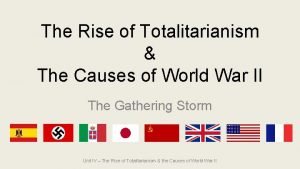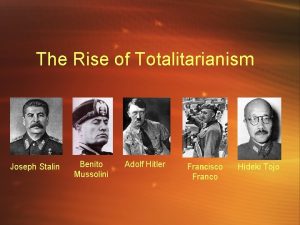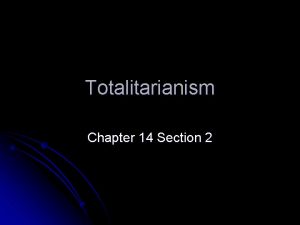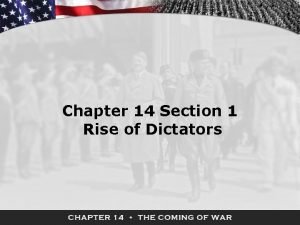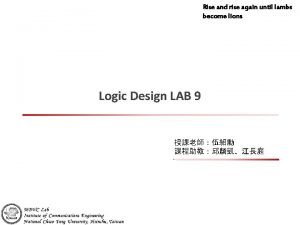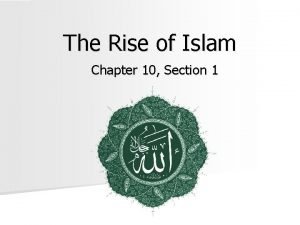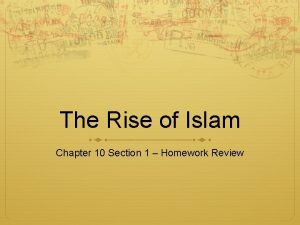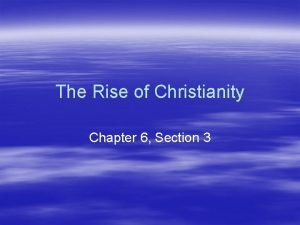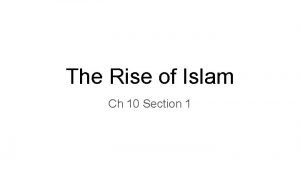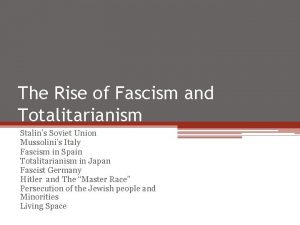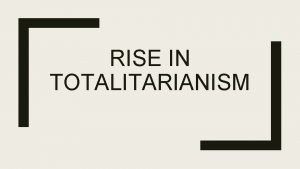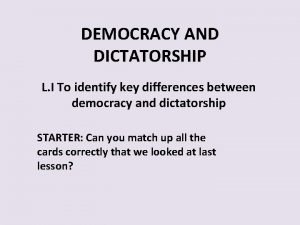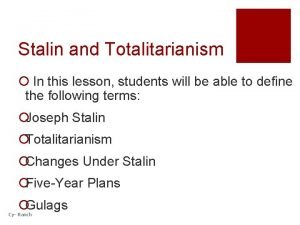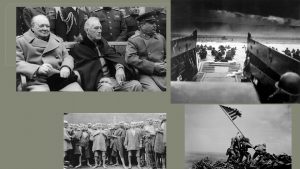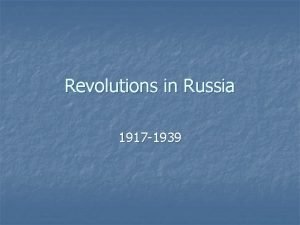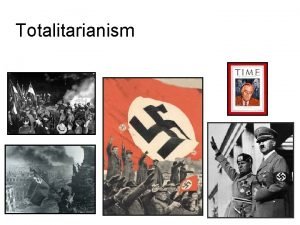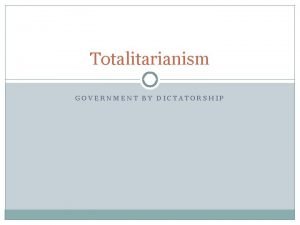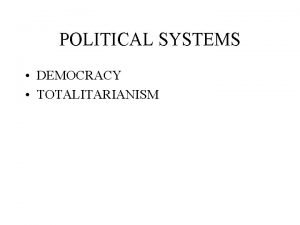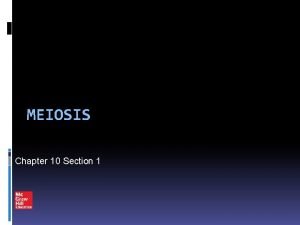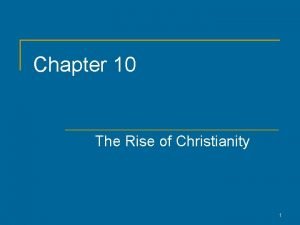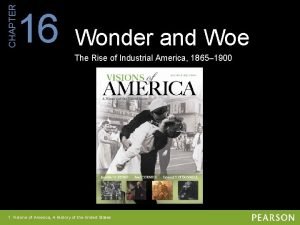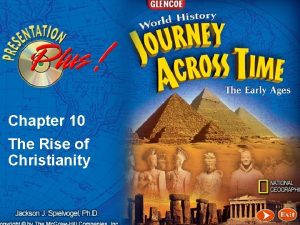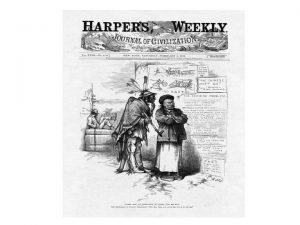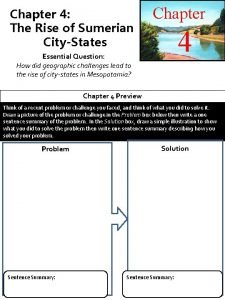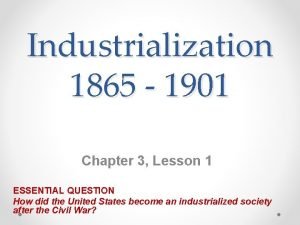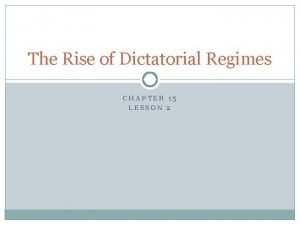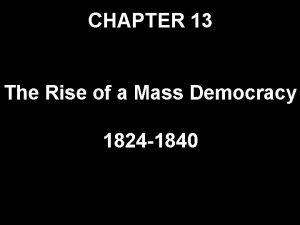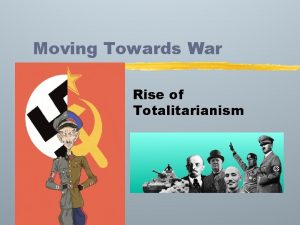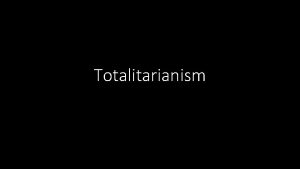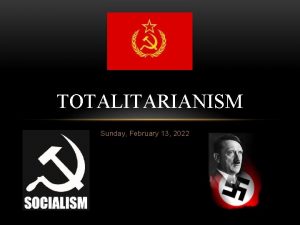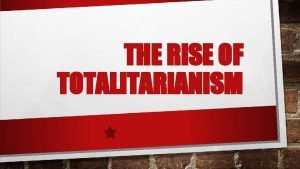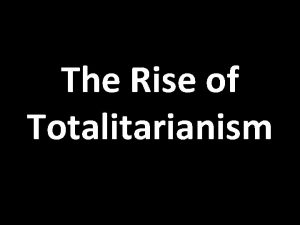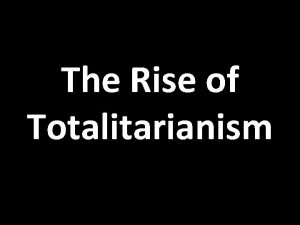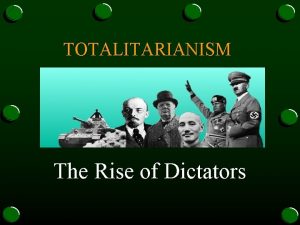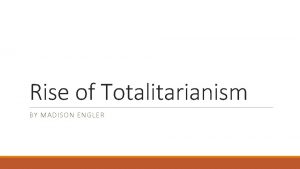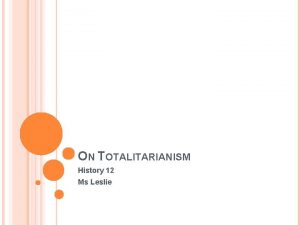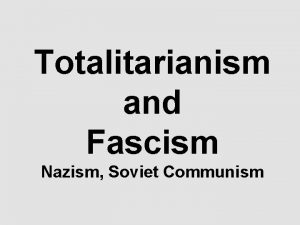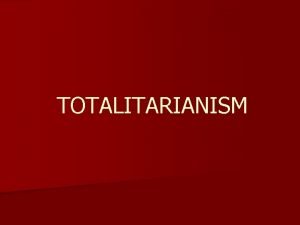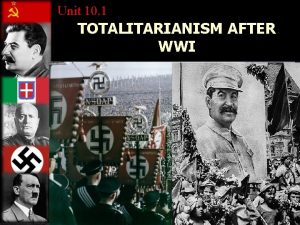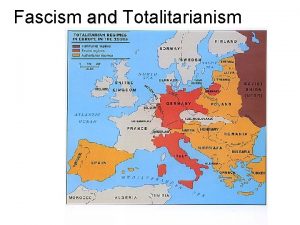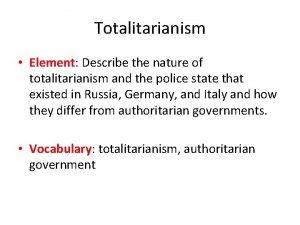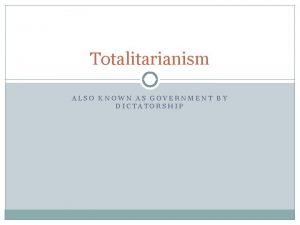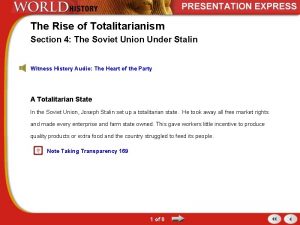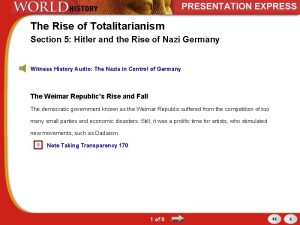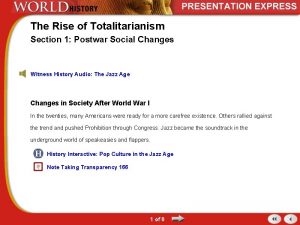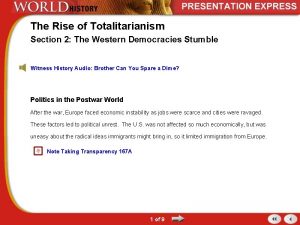Chapter 28 The Rise of Totalitarianism Section 1










































- Slides: 42

Chapter 28: The Rise of Totalitarianism

Section 1: Postwar Social Changes

After World War I End of WWI causes chaos Europe felt like they were in despair Seemed like a whole generation was lost in the battlefield

Changes in Society Technology- affordable cars, improved telephones, new forms of media (motion picture and radio)

Roaring Twenties New sounds of jazz African Americans created their own forms of jazz Europeans embraced American culture Flappers- rebellious young women during the jazz age

Women’s Lives Most women saw a negative affect on their lives after war. Women were forced back into the home when the men came back from war Women did get the right to vote A few women were elected to public office: Mirian Ferguson

Reactions to the Jazz Age Not everyone approved of the lifestyle led by the Jazz Age Prohibition- ban on the manufacturing and the sale of alcoholic beverages Eighteenth Amendment 1919 - Prohibition began Speakeasies- illegal bars

Harlem Renaissance 1920 s- call for cultural awakening African Americans had pride in their unique culture 2 famous African American leaders of the Harlem Renaissance: Claude Mc. Kay and Langston Hughes

Scientific Inventions and Theories Marie Curie- found elements like radium and uranium Einstein’s theory of relativity 1928 - Penicillin would found Freud- Psychoanalysis- method of studying how the brain works and treatment of mental illnesses

Modern Art and Architecture Henri Matisse Pablo Picasso Abstract- composed only of lines, colors, and shapes Dada- rejected all traditional conventions and believed that there was no sense or truth in the world Surrealism- movement that attempted to portray the workings of the unconscious mind

Section 2: The Western Democracies Stumble

Party Struggles in Britain 1920 s- Labour Party surpassed the liberal party Labour Party was moving towards socialism Middle class began to back conservatives who were from the upper class People began to strike Striking then became outlawed

Irish Independence 1914 - Parliament passed “home-rule” for the Irish 1919 - IRA (Irish Nationalist Army)- used guerilla warfare against British forces 1922 - British and Irish reached an agreement Most of Ireland was to become self-governing

“Red Scare” and Isolation in the US feared that Communism would take over in America Police arrested those who tried to emphasize Communism in America US also limited immigration Excluded Chinese and Japanese from the US


Postwar Foreign Policy France wanted to secure borders from Germany France built Maginot Line- along the border of Germany France strengthened securing with the military and asked for protection from its allies France wanted strict enforcement of the Treaty of Versailles

Search for Peace New treaties settled Germany’s dispute over Belgium, Czechoslovakia, and Poland Kellogg-Briand Pact- sponsored by the US in 1928 Renounced war as an instrument of national policy Disarmament- reduction of armed forces and weapons

Postwar Economics Britain and France had huge war debts Both owed the United States for being an ally Reparations damaged Germany’s economy Britain and France’s factories were outdated Unemployment was severe

The Great Depression Wealth created during 1920 s in US was not shared evenly Farmers and unskilled workers were losing money Demand for raw materials skyrocketed Prices fell Farmers and miners suffered

How the Great Depression Started In the 1920 s, prices at the New York Stock Exchange (NYSE) were high The Federal Reserve raised interest rates Ordinary people then became concerned about borrowing money October 1929 - Stock market crashed Sparked the Great Depression

Issues in 1931 Federal Reserves increased interest rate People invested less and less Businesses closed Banks failed Jobless couldn’t afford shelter or food

Great Depression Spread American banks stopped making loans Germany suffered: Germany took out loans from the US to pay for reparations

Democracies React to the Depression How Britain reacted: Britain set up a coalition government made up of a representative from all 3 of the major political parties Britain provided unemployment benefits

Pres. Roosevelt and the New Deal Franklin Delano Roosevelt argued that government should take action Introduced the New Deal Goal: government became involved in people’s everyday lives New laws regulated the stock exchange and bank deposits

Section 3: Fascism in Italy

Mussolini’s Rise to Power Italy joined Allies in 1915 Italy was promised some Austro-Hungarian territories Disorder multiplied in Italy Returning veterans faced unemployment Trade declined Taxes increased

Benito Mussolini Son of a socialist blacksmith 1919 - organized veterans and other discontented Italians Mussolini’s nickname was “Il Duce” meaning “The Leader” Formed Fascist group Name comes from ancient Rome – fasces- means unity Promised to end corruption

Gains Control Organized “combat squads” Squads wore black shirts Black Shirts- a party that rejected the democratic process in favor of violent action

Fascists Take Action 1922 - Fascists went to Rome and demanded government changes Known as the March on Rome Tens of thousands attended Went to King Victor Emmanuel III King Victor Emmanuel asked Mussolini to be Prime Minister

Mussolini Takes Control In the beginning, Fascists only had a few spots in the cabinet. By 1925, Fascists and Mussolini took over the government Fascism is the first totalitarian state One party dictatorship Fascism glorifies the state, destructive to basic human rights

Changes Under Fascism Pope Pius XI supported Fascism because Fascism made the Vatican its own individual state Italy kept a parliamentary monarchy under Fascism

Economy Under Fascism brought the economy under state control Preserved capitalism Fascism economy favored the upper class Production of goods (industrial goods) increased


Society Under Fascism The Fascists suppressed rival parties, censored the press, rigged elections, replaced elected officials with Fascists Anyone who was against Fascism was arrested and put in prison Fascists used secret police and propaganda

Society Under Fascism State (country) is important, each individual is not Men were taught to be harsh warriors Women were not allowed to have paying jobs Had youth groups to prepare children for the military

Section 4: The Soviet Union Under Stalin

Government Under Communism Russia (Soviet Union) is know a totalitarian state Totalitarian state- government controlled by a powerful and complex bureaucracy

Economics Under Communism Stalin’s Five Year Plan Aim/Goal: Build heavy industry, improve transportation, and increased farm output Brought economic activity under the control of the government The government owned all business and resources Command economy- government made all economic activities

Economics Under Communism Plan was to increase production Between 1928 and 1939 - large factories and hydroelectric power stations began in the Soviet Union Oil, coal, and steel production increased Mining grew Railroads were built

Economics Under Communism Agriculture (farming) was under the control of the government Stalin forced peasants to farm on government owned farms Set prices and controlled prices

Society Under Communism Peasants revolted- they did not want to give up land When peasants revolted, Stalin blamed the Kulaks- wealthy farmers Government confiscated kulak’s land sent them to labor camps

Society Under Communism Used secret police, torture, and violent purges to ensure obedience Controlled every aspect of life Violated people’s individual rights Censored all work Gulag- system of brutal labor camps
 The rise of totalitarianism section 5 quiz
The rise of totalitarianism section 5 quiz The rise of totalitarianism section 1 quiz
The rise of totalitarianism section 1 quiz Chapter 13 the rise of totalitarianism
Chapter 13 the rise of totalitarianism Rise of totalitarianism
Rise of totalitarianism Totalitarianism vs authoritarianism
Totalitarianism vs authoritarianism Chapter 14 section 2 totalitarianism
Chapter 14 section 2 totalitarianism Chapter 14 section 1 dictators and war
Chapter 14 section 1 dictators and war Sheep become lions
Sheep become lions Tricky dick: the rise and fall and rise of richard m. nixon
Tricky dick: the rise and fall and rise of richard m. nixon Raise and rise again until lambs become lions
Raise and rise again until lambs become lions Rise and rise again until lambs become lions origin
Rise and rise again until lambs become lions origin Qiyamm
Qiyamm Chapter 10 section 1 the rise of islam
Chapter 10 section 1 the rise of islam Chapter 6 section 3 the rise of christianity answer key
Chapter 6 section 3 the rise of christianity answer key Chapter 10 section 1 the rise of islam
Chapter 10 section 1 the rise of islam Fascism vs totalitarianism
Fascism vs totalitarianism Onjectives
Onjectives Democracy and dictatorship venn diagram
Democracy and dictatorship venn diagram Totalitarianism pictoword
Totalitarianism pictoword Benito mussolini
Benito mussolini Totalitarianism lesson plan
Totalitarianism lesson plan Totalitarianism
Totalitarianism Traits of totalitarianism
Traits of totalitarianism Why did the czars resist change?
Why did the czars resist change? Totalitarianism
Totalitarianism Military dictatorship pros and cons
Military dictatorship pros and cons Secular totalitarianism
Secular totalitarianism Concept mapping chapter 10 meiosis 1 and meiosis 2
Concept mapping chapter 10 meiosis 1 and meiosis 2 Chapter 13 the rise of a mass democracy
Chapter 13 the rise of a mass democracy Chapter 10 the rise of christianity
Chapter 10 the rise of christianity The rise of industrial america chapter 16
The rise of industrial america chapter 16 Chapter 10 the rise of christianity
Chapter 10 the rise of christianity Lesson 5 the rise of segregation
Lesson 5 the rise of segregation Chapter 4 the rise of sumerian city-states
Chapter 4 the rise of sumerian city-states Industrialization (1865 to 1901 worksheet answers key)
Industrialization (1865 to 1901 worksheet answers key) Chapter 15 lesson 2 the rise of dictatorial regimes
Chapter 15 lesson 2 the rise of dictatorial regimes Chapter 13 the rise of a mass democracy
Chapter 13 the rise of a mass democracy Hát kết hợp bộ gõ cơ thể
Hát kết hợp bộ gõ cơ thể Lp html
Lp html Bổ thể
Bổ thể Tỉ lệ cơ thể trẻ em
Tỉ lệ cơ thể trẻ em Chó sói
Chó sói Tư thế worms-breton
Tư thế worms-breton
